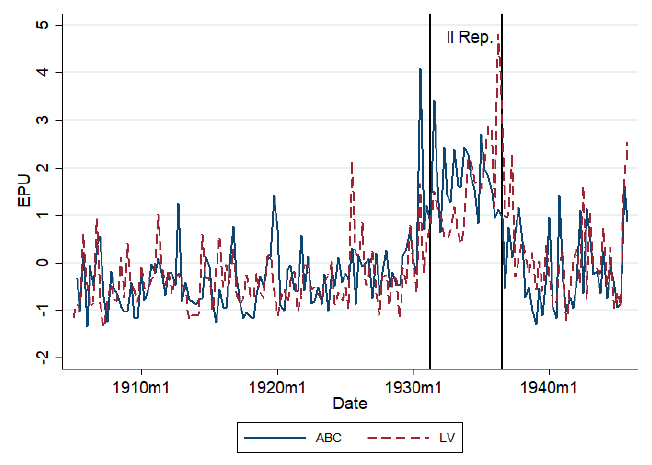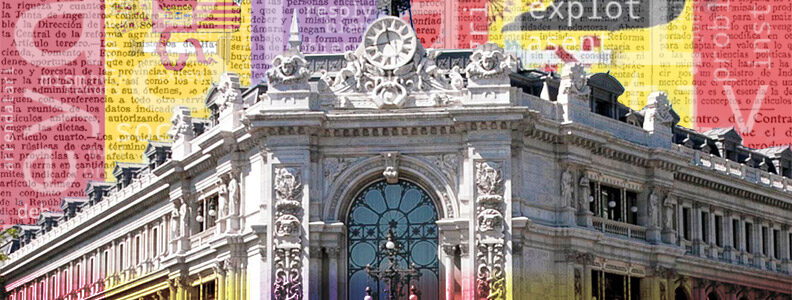Policy efforts to foster economic development might be mitigated by the presence of economic uncertainty or social conflict. In Barcelona BGSE Working Paper 1240, “Economic Uncertainty and Divisive Politics: Evidence from the dos Españas,” Sandra García-Uribe, Hannes Mueller, and Carlos Sanz analyze the interplay between these two effects in Spain over the period 1905-1945.
Historical context: “Las dos Españas”
The beginning of the 20th century was a particularly unstable political period for Spain. The military dictatorship of Primo de Rivera terminated the relatively stable epoch known as “La Restauración.” A dire economic situation together with the loss of support from the army forced the general to resign and Spain transitioned into the Second Republic in 1931. Fascist movements progressively gained force until, in 1936, a civil war broke out between left wing forces and nationalists. The latter won the war in 1939 and Francisco Franco ran a dictatorship until his death in 1975.
Particularly interesting is the period of the Second Republic, was the term “Las dos Españas” (the two Spains) in reference to the high divisiveness which existed between left and right political ideologies at the time. Following the discussion by historic scholars, the authors divide the issues that had a higher impact on political polarization into four broad categories: Socio-economic conflict, regional separatism, the power of the military and the role of the church and education.
Text mining and empirical analysis
The authors rely on text mining to build a unique data set for the historical period in question. In order to carry out their methodology, they read in articles from two of the main newspapers of the time: La Vanguardia and ABC.
Building on previous work, they construct an index that accounts for economic and political uncertainty (EPU, that was proposed by Baker, Bloom and Davis, 2016). Equally important is to quantify the influence of each of the issues outlined above. In essence, this is done by building a dictionary of terms that characterizes specific groupings. For instance, the socio-economic conflict dictionary contains terms related to the highly divisive agrarian reform introduced during the Republic aimed at changing the distribution of land. Similarly, the regional separatism dictionary corresponds to the avid Catalan and Basque nationalist movements of that time.
Figure 1 shows the monthly evolution of the EPU index for both newspapers. Remarkably, the period corresponding to the Second Republic presents a sharp increase in the index that then stabilizes again during the civil war and Franco’s dictatorship. Furthermore, the fact that the estimations remain fairly similar across two newspapers with considerably different editorial policy points towards the robustness of the result. The interesting question is then: what are the factors behind these changes?

Note: EPU is constructed using information from the newspapers ABC y La Vanguardia (LV)
In order to quantify the relative importance of each of the four polarization issues, the authors perform a regression analysis of the EPU index on the index of the divisive political issues and a set of controls. Importantly, the most demanding specification accounts for newspaper and time fixed effects as to control for potential trends in economic conditions or regime characteristics that affected both newspapers in a similar way. The significance of the coefficient on socio-economic issues survives and remains high for all specifications and a variety of robustness tests such as the incorporation of daily variation or a different construction of the dictionaries.
A method for studying today’s polarized democracies
In summary, the authors quantify economic policy uncertainty for the beginning of the 20th century in Spain using a novel database based on text mining tools. Their results show that uncertainty was unusually high in the period corresponding to the Second Republic and demonstrate a robust correlation between this uncertainty and socio-economic issues. Although establishing a clear causal relationship is a difficult task, the results unveil a clear link between the difficulties faced by Republican institutions in handling internal socio-economic conflict and the emergence of the civil war.
Finally, this analysis serves as a warning for the recent increase in political polarization observed in Western democracies as well as a methodological benchmark for the potential for text mining as a means of studying it.




